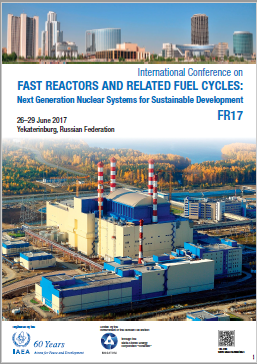Speaker
Prof.
Augusto Gandini
(Sapienza University of Rome)
Description
**Recent and potential advances of the Heuristically based Generalized Perturbation Theory (HGPT) methodology are discussed:**
- *The subcriticality monitoring method*
Basing on the HGPT methodology applied to subcritical systems, a procedure is described for the online monitoring of the subcriticality level of ADS reactors with minimal interaction with the plant normal operation.
The proposed method consists in compensating slow, small movements of a control rod with likewise slow, small alterations of the external source strength, so that the overall power is maintained constant.
The estimation of the subcriticality level requires the knowledge of a bias factor. This implies the standard precalibration of a control rod and the precalculation of the importance function associated with the reactor power control (in this case, the external neutron source strength).
- *The hot spot identification by sensitivity analysis and probabilistic inference*
A method is described by which the information obtained on-line through a system of neutron measuring devices such as self-powered neutron detectors (SPNDs, called also collectrons) inserted in the core of a nuclear power reactor allows the on-line detection of a possible hot spot during plant operation. The method is based on the HGPT techniques, for the calculation of the sensitivity coefficients of the integral quantities measured with the collectrons with respect to parameters representative of the hot spot, and on the use of statistical inference techniques, taking into account the errors associated with the measurements. The methodology allows to assess the effect on the quality of the hot point detection system following possible failures of the measuring devices during the core life cycle. Such an assessment may be useful for defining an adequate protection strategy in terms of quality, number and distribution of the collectrons. This method has been initially aimed to be adopted in thermal power systems, but with advanced detection techniques underway it might be adopted also in fast ones.
- *Use of the GPT methodology for the analysis of reactivity worths with Monte Carlo*
Perturbation methods are part of the reactor physics foundation for the study of fundamental quantities considered in design and safety analysis of nuclear reactors. In deterministic codes standard perturbation theory (SPT) and generalized perturbation theory (GPT) methods have been historically developed and used. Monte Carlo codes, such as MCNP 6.1, can also perform, via adjoint weighted tally, SPT calculations of reactivity worths. A method is proposed to enable Monte Carlo codes to implement GPT.
Country/Int. Organization
Sapienza University, Rome (Italy)
Author
Prof.
Augusto Gandini
(Sapienza University of Rome)

